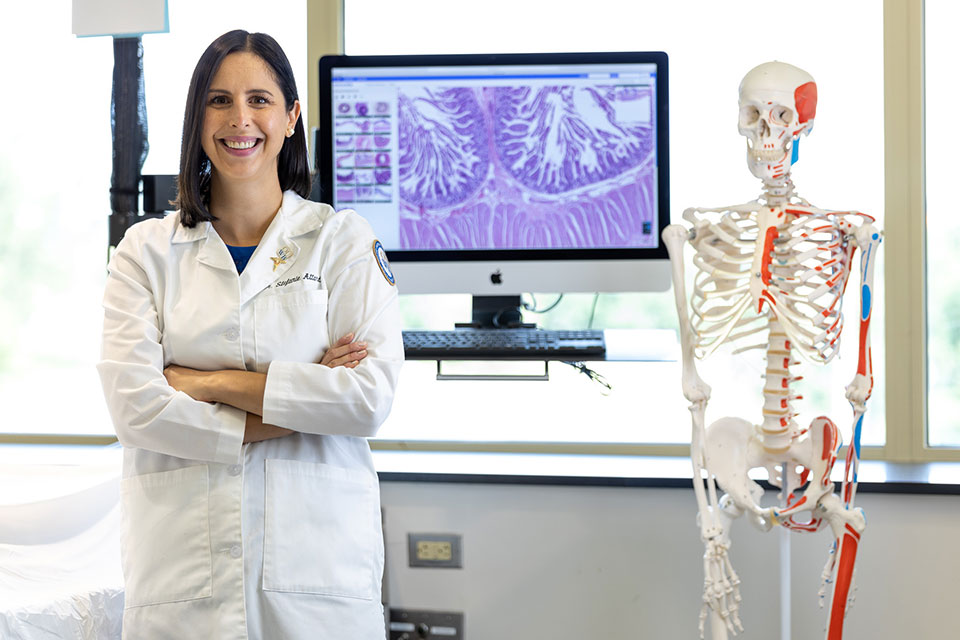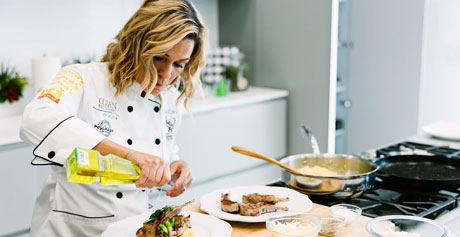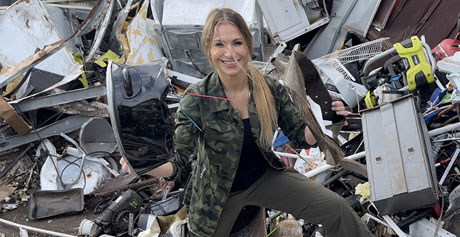A One-on-One Conversation With Assistant Professor, Department of Foundational Medical Studies At Oakland University William Beaumont School of Medicine, Dr. Stefanie Attardi

Q: As Assistant Professor at Oakland University William Beaumont School of Medicine, you teach histology and gross cadaveric anatomy to medical students. For those in our audience not familiar with these terms, can you tell us more about them?
SA: “Histology” is the microscopic study of the body’s cells, tissues, and organs; the structures that cannot be seen with the naked eye. “Gross anatomy,” on the other hand, is the study of the body’s structures at the visible level. “Cadaveric anatomy” is a term used to specify that body donors are used in the teaching and learning of anatomy. At Oakland University William Beaumont School of Medicine, our students are privileged to learn cadaveric anatomy from from people who have donated their bodies to education.
Q: How many years does it take to become an Assistant Professor? Can you share the process you went through?
SA: Becoming an assistant professor in the United States typically requires a terminal degree, which is the highest degree that can be awarded in your field. The process takes about 10 years. I spent four years earning my Bachelor of Science degree in Life Sciences, a year and a half earning a Master of Science in anatomical sciences, and four years earning my Doctor of Philosophy (Ph.D.) in clinical anatomy.
Q: Why did you choose this profession?
SA: One Halloween when I was little, I was afraid of skeletons, so my mom talked to me about bones and how they help us stand up. I became fascinated by what was hiding under our skin. I loved going to the doctor to see the anatomical illustrations hung on the walls. For that reason, I wanted to become a physician. After my undergraduate degree, I shadowed physicians and also spent a lot of time in their offices as a pharmaceutical representative. I realized I was initially attracted to the profession because I was passionate about teaching people about their bodies, and less so the diagnostics and patient care. This is when I re-evaluated my goals and decided to pursue graduate school and become a professor of anatomical sciences. Chasing a dream often involves realizing new dreams.
Q: What do you think are the most important attributes of a good instructor?
SA: A good teacher has good interpersonal skills. To teach well, we must get to know our students as not only learners, but as human beings. Most of the time when our students are struggling academically, it is because of what’s happening in their lives outside of the classroom. The more we get to know them, the better we can support their development.
Q: What advice would you give to young women who want to pursue a career as a teacher of higher education?
SA: If you would like to teach at a university, pursue a terminal degree in your field. First, select your thesis supervisor wisely. Your supervisor should not only be an expert in the field, but someone who is interested in your professional development. This type of person will likely care about your advancement after you have graduated. Second, make sure your graduate program has ample teaching assistantship opportunities. Seek additional opportunities to develop teaching skills. For example, ask to give guest lectures in a course. Volunteer to teach in outreach programs. Take a course about education.
Q: Were there moments in your career that were pivotal to getting where you are today?
SA: The way you conduct yourself during your training matters. Never giving less than 100% during my Ph.D. gained me the trust and confidence of my supervisor, Dr. Kem Rogers. He has supported me through everything in my career, including securing my job. To this day, he is still a trusted mentor, and I would not be where I am today without him.
Q: What is it about your job that most excites you?
SA: Being in our dissection laboratory. Learning from a real human body is a rare privilege and it’s unsurpassed by any other modality. I have worked with body donors for nearly two decades, and I still approach each laboratory with the same awe and wonderment as our new students.
Q: What's your advice for women in male-dominated fields?
SA: Mentors, mentors, mentors! Identify more than one trusted mentor to help you navigate your field. It is important to have diverse mentors who can help you grow in different ways. But especially make sure to have at least one mentor who shares many of your identities and has been in your shoes. This might mean that you have to seek outside of your organization to find the right fit.
Q: What's the greatest fear you've had to overcome to get where you are today?
SA: I’ll be frank: debilitating anxiety. I immigrated to the United States from Canada alone, before my husband could join me. I did not anticipate how difficult it would be to adapt alone to a new city, home, and career, and to navigate various systems in the U.S. that are vastly different from Canada. With encouragement from my husband and family, I reached out to my employer and healthcare professionals for support, and I was able to mitigate the physical and mental symptoms associated with severe anxiety. Looking back, I have re-framed this time in my life as a positive learning experience. Now I can better understand and support my first-year students who might be experiencing something similar as they matriculate into our medical program.
Q: Which woman inspires you and why?
SA: My mom, who does it all, and in her own way. She worked in a pharmaceutical laboratory, was a stay-at-home mom and community volunteer, and then graduated with her second college degree in her late 30s so she could purse a new career. Most of all, she is a good listener and respects others no matter how different they are from her.
Q: What are some of the challenges you feel women face today?
SA: Females who choose to have children face career challenges in academia. For many, welcoming a new child and raising young children coincides with the most pivotal points of an academic career. For example, completing your terminal degree or while working as an assistant professor who is required to achieve promotion and tenure in a set timeline. Research has shown that female academics who extend their tenure clock, say for familial responsibilities, are disadvantaged compared to their male counterparts who do the same. Academia has a lot of work to do in this area.
Q: What advice would you give to young women who want to succeed in the workplace?
SA: Choose your employer wisely, even if this means considering wider range of jobs and locations. Look for evidence of their commitment to the advancement of women workplace. For example, women holding senior leadership positions, structured mentoring programs, sponsorship of professional development for women, and company policies that support women both in and out of the workplace.
Q: Can you tell us how you manage your work life balance?
SA: I meet regularly with a professional coach, Dr. Elizabeth Odders-White, to tackle this.
I schedule everything in advance using my Google Calendar. These are not only meetings and obligations to others but blocking off time for every solo task. Scheduling everything provides me with visual proof that my days are full and that I should not feel guilty saying “no” to new responsibilities. I will even block off times a year in advance for recurring annual tasks, such as writing conference proposals and preparing for fall teaching. I have also written my own mission and values statement that includes my personal goals. When I’ve spent time with my family despite a looming to-do list at work, I feel successful because I’m fulfilling my mission and values.
24 Things About Dr. Stefanie Attardi
1. What's your favorite family tradition?
Deep frying fresh calamari (squid) together on Christmas Eve.
2. What celebrity would you like to meet at Starbucks for a cup of coffee?
Dan Levy. He seems like he’d be a riot. I am proud that his record-breaking show, Schitt’s Creek, is Canadian (filmed near where I grew up!) Most of all, I admire him for writing strong and positive LGBTQ+ characters into the series.
3. What’s your favorite thing to do in your free time?
Sitting by the water with my husband and / or reading a good book.
4. Who is the most fascinating person you’ve ever met?
My friend, mentor, and fellow anatomist, Dr. Judith Venuti. She is an award-winning medical educator, developmental biologist, and volunteer. Among her interests are traveling the world, scuba diving, crocheting anatomical models, and making computer animated teaching aids for embryology.
5. What was the last book you really got into?
Fall on Your Knees, by Ann-Marie MacDonald. I gave a standing ovation in my bedroom when I finished. It’s a generational saga, full of twists and turns, which takes place on Cape Breton Island in the early 20th century.
6. What’s the most amazing adventures have you’ve ever been on?
Backpacking in Europe for a month with a carry-on and a Eurail pass.
7. Among your friends, what are you best known for?
Creating embarrassing nicknames for everyone (except myself) that stand the test of time.
8. What’s your favorite international food?
Italian, cooked by my family
9. What’s your favorite app on your phone?
Goodreads. It’s perfect for finding new books, seeing what your friends are reading, and setting a yearly reading goal.
10. What’s your favorite quote or saying?
“Stop talking about love…It means nothing…What you feel only matters to you. It's what you do to the people you say you love, that's what matters. It's the only thing that counts.” – The Last Kiss (Movie)
11. If you unexpectedly won $10,000, what would you spend it on?
A medical student scholarship.
12. Are you a morning person or a night owl?
Night owl (especially if a good book is involved)
13. Tell me about the best vacation you’ve ever taken.
Renting a big house on the Sunshine Coast in British Columbia with my best friends from university. We are scattered across Canada and the U.S., so it’s important for us to connect on vacations. We like cooking dinners together and hiking.
14. Do you read reviews, or just go with your gut?
I am a planner, so I always read reviews in advance
15. What’s your big passion?
Teaching anatomy
16. What’s your signature drink?
An oaky chardonnay
17. What is your favorite game or sport to watch and play?
I love going to NHL games (hockey). Let’s go Red Wings!
18. Which of the five senses would you say is your strongest?
Sight. I have a good memory for visual materials, which bodes well for memorizing anatomical structures!
19. If you could go back in time to change one thing, what would it be?
I wish I was more athletic growing up. I exercise regularly now, and it does wonders for my health and well-being.
20. What were you like in high school?
Loud and ambitious.
21. What would your perfect Saturday be like?
Sleeping in, reading by the water, practicing piano, and trying a new restaurant with my husband.
22. Would you rather cook or order in?
Cook
23. What was your favorite subject in school?
Biology
24. Cake or pie?
Pie (Michigan cherry


